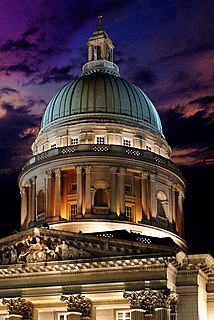
An appellate court, commonly called an appeals court, court of appeals, appeal court, court of second instance or second instance court, is any court of law that is empowered to hear an appeal of a trial court or other lower tribunal. In most jurisdictions, the court system is divided into at least three levels: the trial court, which initially hears cases and reviews evidence and testimony to determine the facts of the case; at least one intermediate appellate court; and a supreme court which primarily reviews the decisions of the intermediate courts. A jurisdiction's supreme court is that jurisdiction's highest appellate court. Appellate courts nationwide can operate under varying rules.
In common law systems, a superior court is a court of general competence which typically has unlimited jurisdiction with regard to civil and criminal legal cases. A superior court is "superior" in relation to a court with limited jurisdiction, which is restricted to civil cases involving monetary amounts with a specific limit, or criminal cases involving offenses of a less serious nature. A superior court may hear appeals from lower courts. The highest of the superior courts is the Supreme court.

A tribunal, generally, is any person or institution with authority to judge, adjudicate on, or determine claims or disputes—whether or not it is called a tribunal in its title. For example, an advocate who appears before a court with a single judge could describe that judge as "their tribunal". Many governmental bodies that are titled 'tribunals' are so described to emphasize that they are not courts of normal jurisdiction. For example, the International Criminal Tribunal for Rwanda was a body specially constituted under international law; in Great Britain, employment tribunals are bodies set up to hear specific employment disputes. In many cases, the word tribunal implies a judicial body with a lesser degree of formality than a court, to which the normal rules of evidence and procedure may not apply, and whose presiding officers are frequently neither judges nor magistrates. Private judicial bodies are also often styled 'tribunals'. However, the word tribunal is not conclusive of a body's function—for example, in Great Britain, the Employment Appeal Tribunal is a superior court of record.

A Qadi is the magistrate or judge of a Sharia court, who also exercises extrajudicial functions, such as mediation, guardianship over orphans and minors, and supervision and auditing of public works.
The court system of Canada forms the judicial branch of government, formally known as "The Queen on the Bench", which interprets the law and is made up of many courts differing in levels of legal superiority and separated by jurisdiction. Some of the courts are federal in nature, while others are provincial or territorial.

The legal system of Singapore is based on the English common law system. Major areas of law – particularly administrative law, contract law, equity and trust law, property law and tort law – are largely judge-made, though certain aspects have now been modified to some extent by statutes. However, other areas of law, such as criminal law, company law and family law, are almost completely statutory in nature.

The Judiciary of the Hong Kong Special Administrative Region is the judicial branch of the Hong Kong Special Administrative Region. Under the Basic Law of Hong Kong, it exercises the judicial power of the Region and is independent of the executive and legislative branches of the Government. The courts in Hong Kong hear and adjudicate all prosecutions and civil disputes, including all public and private law matters.

The law of Hong Kong is unique, being a common law system preserved, after the handover to China in 1997, within the civil law system of the People's Republic of China (PRC), under the principle of ‘one country, two systems'. Since the handover, the constitutional framework is provided by the Hong Kong Basic Law, which is a national law of the PRC and has constitutional status in Hong Kong.

The supreme court is the highest court within the hierarchy of courts in many legal jurisdictions. Other descriptions for such courts include court of last resort, apex court, and highcourt of appeal. Broadly speaking, the decisions of a supreme court are not subject to further review by any other court. Supreme courts typically function primarily as appellate courts, hearing appeals from decisions of lower trial courts, or from intermediate-level appellate courts.

Arbitration, a form of alternative dispute resolution (ADR), is a way to resolve disputes outside the courts. The dispute will be decided by one or more persons, which renders the 'arbitration award'. An arbitration award is legally binding on both sides and enforceable in the courts.
The Victorian Civil and Administrative Tribunal (VCAT) was formed by the Victorian Civil and Administrative Tribunal Act 1998 in the state of Victoria, Australia. As part of the Victorian Justice system the Tribunal sits 'below' the Magistrates Court in the court hierarchy. However the Tribunal itself is not a Court as it is a creature of statute and has no inherent jurisdiction or powers. VCAT was primarily a forum for litigants-in-person and the participation of lawyers or other legal representatives is not encouraged in some List areas, substantially reducing the cost of litigation. However some of the List areas will by necessity require parties to have some form of representation.

The Scottish Land Court is a Scottish court of law based in Edinburgh with subject-matter jurisdiction covering disputes between landlords and tenants relating to agricultural tenancies, and matters related to crofts and crofters. The Scottish Land Court is both a trial court and an appeal court; hearings at first-instance are often heard by a Divisional Court of one of the Agricultural Members advised by the Principal Clerk. Decisions of the Divisional Court can be appealed to the Full Court, which will consist of at least one legally qualified judicial member and the remaining Agricultural Member. Some cases are heard at first-instance by the Full Court, and these cases may be appealed to the Inner House of the Court of Session.
The Ministry of Law and Justice in the Government of India is a cabinet ministry which deals with the management of the legal affairs, legislative activities and administration of justice in India through its three departments namely the Legislative Department and the Department of Legal Affairs and Department of Justice respectively. The Department of Legal Affairs is concerned with advising the various Ministries of the Central Government while the Legislative Department is concerned with drafting of principal legislation for the Central Government. The ministry is headed by a cabinet rank minister appointed by the President of India on the recommendation of the Prime Minister of India. The first Law and Justice minister of independent India was Dr. B. R. Ambedkar, who served in Prime Minister Jawaharlal Nehru's cabinet during 1947–51. Ravi Shankar Prasad is the current Minister of Law and Justice.
The Ministry of Justice is a is the cabinet ministry of the Government of Sri Lanka responsible for the implementation of policies, plans and programmes for the administration of the country's justice system, and thereby administers its courts and prisons. Ali Sabry is the incumbent Minister of Justice as of 12 August 2020.
Saleem Marsoof, PC is a Sri Lankan judge and lawyer. He is a judge of the Supreme Court of Sri Lanka and former President of the Court of Appeal. He is also a non-resident Justice of Appeal of the Supreme Court of Fiji.
Local government is the third and lowest level of government in Sri Lanka – after the central government and provincial councils. The local government bodies are collectively known as local authorities. They are responsible for providing a variety of local public services including roads, sanitation, drains, housing, libraries, public parks and recreational facilities. Local authorities are divided into three different groups: municipal councils, urban councils and divisional councils. As of November 2017 there were 341 local authorities. All local authorities are elected using the mixed electoral system.
The Landlord and Tenant Board is an adjudicative tribunal operated by the government of Ontario that provides dispute resolution of landlord and tenant matters under the Residential Tenancies Act, 2006. It is one of the eight social justice tribunals in Ontario.
A mental health tribunal is a specialist tribunal (hearing) empowered by law to adjudicate disputes about mental health treatment, primarily by conducting independent reviews of patients diagnosed with mental disorders who are detained in psychiatric hospitals, or under outpatient commitment, and who may be subject to involuntary treatment.
The Judiciary of Sri Lanka are the civil and criminal courts responsible for the administration of justice in Sri Lanka. The Constitution of Sri Lanka defines courts as independent institutions within the traditional framework of checks and balances. They apply Sri Lankan Law which is an amalgam of English common law, Roman-Dutch civil law and Customary Law; and are established under the Judicature Act No 02 of 1978 of the Parliament of Sri Lanka.








